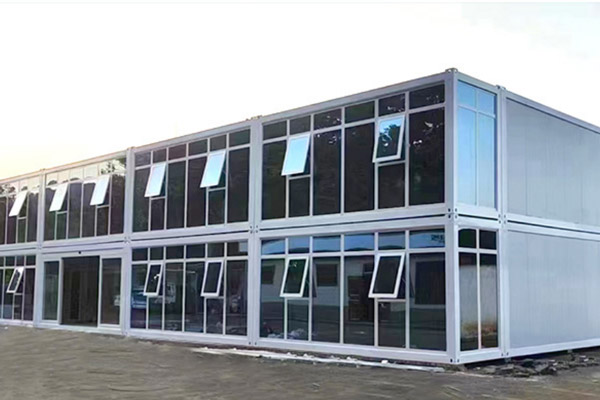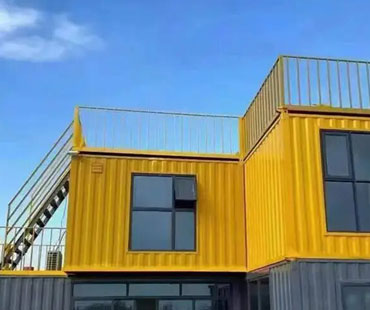As China’s urban population continues to grow at an unprecedented rate, housing affordability and sustainability have become pressing challenges. Traditional construction methods often involve long build times, high labor costs, and significant environmental impact. In response to these challenges,container homes have emerged as a revolutionary alternative, offering a flexible, cost-effective, and eco-friendly solution to urban housing demands. From recycled shipping containers to fully customized modular units, container homes in China are redefining the way people live, work, and engage with urban spaces.
One of the most significant advantages of container homes is theiraffordability. Conventional urban housing in China often requires significant capital investment, making it difficult for young professionals, migrant workers, and low- to middle-income families to secure adequate living space.
1.Lower Construction Costs
Shipping containers are widely available in China due to the country’s massive export and import infrastructure. Repurposing these containers into homes dramatically reduces material costs. Compared to traditional brick-and-mortar construction, container homes can cost 30–50% less, depending on design complexity and interior finishes.
2.Shorter Build Times
Traditional residential construction often takes months or even years to complete. Container homes, by contrast, can be prefabricated off-site and installed on-site within weeks. This modular construction process allows developers to quickly respond to housing shortages and rapidly deploy affordable housing solutions.
3.Scalable Solutions for Urban Development
Container homes can be stacked vertically or arranged in clusters to create multi-unit residential complexes. This scalability makes them an ideal solution for high-density urban areas where land is limited and construction efficiency is critical.
Beyond affordability, container homes offersustainability advantages that align with China’s national goals for reducing carbon emissions and promoting green urban development.
1.Recycling and Reuse
Using decommissioned shipping containers as the base structure reduces the demand for new construction materials. Each container repurposed is a step toward minimizing industrial waste and giving a second life to a durable steel structure.
2.Energy Efficiency
Container homes can be insulated with eco-friendly materials, fitted with energy-efficient windows and doors, and integrated with solar panels or rainwater collection systems. These features reduce energy consumption and utility costs, contributing to greener urban living.
3.Reduced Construction Waste
Traditional construction generates significant debris and pollution. Container homes are prefabricated, which means fewer on-site modifications, less waste, and a smaller overall environmental footprint.
4.Urban Greening Integration
Container home communities can incorporate green roofs, vertical gardens, and landscaped courtyards, further promoting environmental sustainability and improving residents’ quality of life.

Container homes are inherentlymodular, allowing for high levels of customization to meet diverse lifestyle and functional needs.
1.Residential Applications
From tiny studios for single professionals to multi-bedroom family units, container homes can be adapted to a wide range of residential requirements. Interior layouts can be tailored with kitchens, bathrooms, living spaces, and storage solutions optimized for compact urban living.
2.Commercial and Office Use
Container modules can also be converted into office spaces, cafes, retail shops, or pop-up stores. Their modularity allows businesses to quickly set up or relocate, providing a dynamic alternative to traditional commercial spaces.
3.Mobile and Temporary Housing
Container homes are ideal for temporary housing solutions such as student accommodations, construction site dormitories, or disaster relief housing. Their portability allows for relocation without significant infrastructure investment.
4.Architectural Innovation
Designers in China are embracing creative container home configurations, integrating large glass panels, open terraces, and hybrid materials to create aesthetically pleasing and functional living spaces.
China’s rapid urbanization has created challenges such as high property prices, limited land availability, and pressure on infrastructure. Container homes address these challenges in several ways:
1.Maximizing Land Use
The vertical stacking capability of container modules allows developers to maximize limited urban plots, creating high-density housing without sacrificing open space or community amenities.
2.Affordability for Young Urban Residents
By lowering construction and maintenance costs, container homes provide an accessible entry point for young professionals and first-time buyers, helping alleviate housing pressure in major cities like Shanghai, Beijing, and Shenzhen.
3.Supporting Sustainable Urban Growth
Container home communities can be integrated into city planning, providing flexible housing solutions while reducing the environmental footprint of urban expansion.
Several pilot projects in China demonstrate the success of container homes:
Shanghai Container Park: Originally designed as pop-up retail spaces, modular containers were converted into compact, stylish studios for short-term rental.
Guangzhou Urban Housing Pilot: A mixed-use container home complex combines residential units with community amenities, offering affordable urban living with modern design.
Shenzhen Eco-Village: Container homes are combined with solar panels, rainwater harvesting, and green roofs, showcasing sustainable urban living.
These examples highlight how container homes can address housing shortages, promote sustainability, and offer flexible design solutions.
Container homes in China represent arevolutionary approach to urban living, combining affordability, sustainability, flexibility, and speed of construction. They address critical housing challenges in rapidly growing cities, reduce environmental impact, and provide innovative solutions for both residential and commercial applications. As design innovation continues and government policies increasingly support sustainable housing, container homes are poised to become a significant component of China’s urban landscape, offering practical, eco-friendly, and stylish solutions for modern city life.


